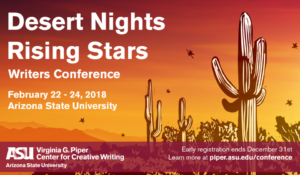
AWP won’t come around again until next year, but if you’re thinking of attending, it is never too early to start preparing. We’ve compiled a few survival tips to help you navigate and adjust to the dizzying pace of your first AWP conference.
1. Wear comfortable shoes. AWP is the biggest writer’s conference in the US, meaning it will be sprawled across an enormous venue. You’ll be doing a lot of walking between panels – and possibly some running if you’re lost or trying to see more than one panel per hour. Leave those fancy shoes, high heels, or dress shoes that pinch your toes at home.
2. See more than one panel per hour – at least on your first day. It’s perfectly acceptable to leave mid-panel (although to be polite we suggest you do it during applause or between speakers). Take advantage of the multitude of offerings to see and learn as much as possible. Using this strategy the first day will give you a good idea of what kind of panels are useful to you and which ones are way over your head or just too basic.
3. Find overlapping topics in order to narrow down your panel list. Dying to see that panel on political poetry that conflicts with the one that offers advice on submissions? See if there are other panels that deal with politics in literature. Finding overlap is a good way to narrow down your list to those panels that you just can’t miss.
4. Wear pants. This mainly applies to women (though gents, it’s probably not a good idea to show up without your pants). You’ll most likely end up sitting on the floor, walking up stairs, or as we mentioned earlier, running (there is a lot of running), so if your heart is set on wearing a skirt, make sure you can still sit on the floor comfortably.
5. Sit on the floor. Popular panels get crowded fast, but don’t let it discourage you. You don’t necessarily have to see the panelists’ faces to absorb their great advice. Plus, it’s easier to leave between speakers when you’re not trapped in the front row with all eyes on you.
6. Try not to step on the floor-sitters’ appendages. Take it from me — having your foot or your fingers stomped on hurts.
7. Scope out nearby diners for coffee and affordable food. Chances are, the prices at your hotel are going to be high. Even the servers treat their prices like a joke. “Will you be ordering off the menu, or would you like to try our sixteen dollar breakfast bar?” one waiter asked us with an ironic smile. A little bit of walking will keep you from emptying your wallet just for a bottle of water.
8. Bring snacks. With all those panels, there may not be time for lunch, and with those amusingly high prices, keeping supplies with you can end the temptation to buy that $16.00 bottle of water. We writers aren’t exactly a wealth-soaked group, so no one will judge you for pulling out a sleeve of Ritz crackers during a panel. Just remember to clean up after yourself and try not to make a mess.
9. Go to the dance party, especially if you’re over 21. Nowhere else in the world will you find so many half-drunk writers shaking it like a Polaroid picture on the dance floor. Make a game out of it. See how many poets & fiction writers you can find doing the Macarena or the Robot. Remember to tip well at the bar and ask for two drinks at a time in order to avoid the long lines. Use whatever time you do spend waiting in line to make new friends.
10. Hang out with the friends you made at events and panels. See where they’re going for dinner and tag along. Visit their tables at the book fair. Don’t be shy. Being at AWP, you already have a lot in common.

